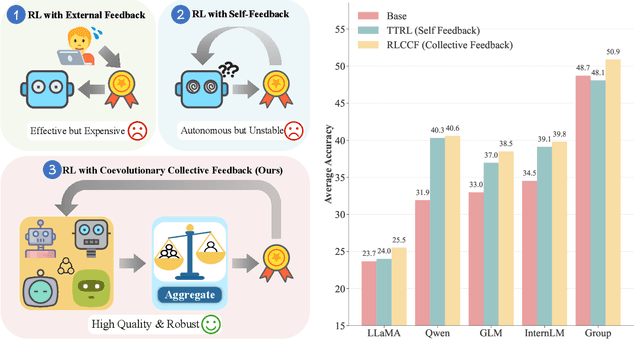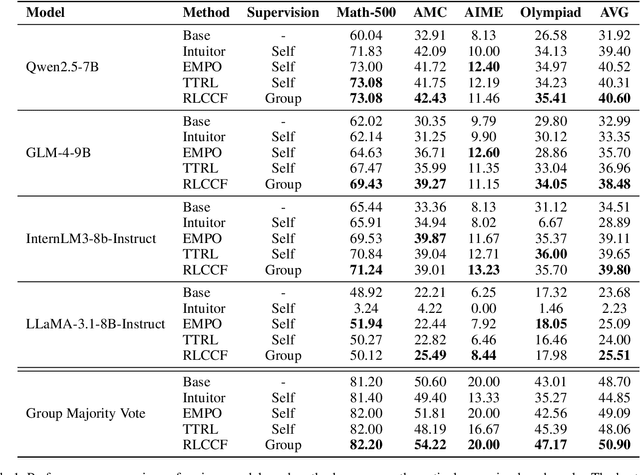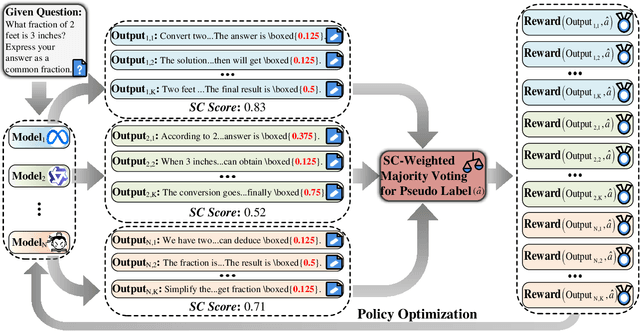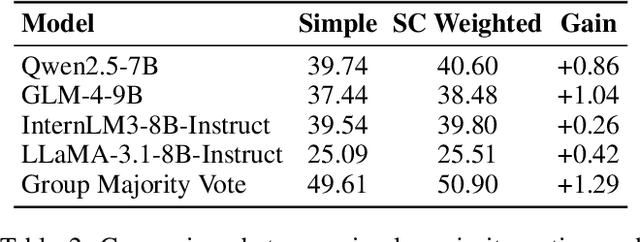Ganqu Cui
Teaching Large Reasoning Models Effective Reflection
Jan 19, 2026Abstract:Large Reasoning Models (LRMs) have recently shown impressive performance on complex reasoning tasks, often by engaging in self-reflective behaviors such as self-critique and backtracking. However, not all reflections are beneficial-many are superficial, offering little to no improvement over the original answer and incurring computation overhead. In this paper, we identify and address the problem of superficial reflection in LRMs. We first propose Self-Critique Fine-Tuning (SCFT), a training framework that enhances the model's reflective reasoning ability using only self-generated critiques. SCFT prompts models to critique their own outputs, filters high-quality critiques through rejection sampling, and fine-tunes the model using a critique-based objective. Building on this strong foundation, we further introduce Reinforcement Learning with Effective Reflection Rewards (RLERR). RLERR leverages the high-quality reflections initialized by SCFT to construct reward signals, guiding the model to internalize the self-correction process via reinforcement learning. Experiments on two challenging benchmarks, AIME2024 and AIME2025, show that SCFT and RLERR significantly improve both reasoning accuracy and reflection quality, outperforming state-of-the-art baselines. All data and codes are available at https://github.com/wanghanbinpanda/SCFT.
JustRL: Scaling a 1.5B LLM with a Simple RL Recipe
Dec 18, 2025Abstract:Recent advances in reinforcement learning for large language models have converged on increasing complexity: multi-stage training pipelines, dynamic hyperparameter schedules, and curriculum learning strategies. This raises a fundamental question: \textbf{Is this complexity necessary?} We present \textbf{JustRL}, a minimal approach using single-stage training with fixed hyperparameters that achieves state-of-the-art performance on two 1.5B reasoning models (54.9\% and 64.3\% average accuracy across nine mathematical benchmarks) while using 2$\times$ less compute than sophisticated approaches. The same hyperparameters transfer across both models without tuning, and training exhibits smooth, monotonic improvement over 4,000+ steps without the collapses or plateaus that typically motivate interventions. Critically, ablations reveal that adding ``standard tricks'' like explicit length penalties and robust verifiers may degrade performance by collapsing exploration. These results suggest that the field may be adding complexity to solve problems that disappear with a stable, scaled-up baseline. We release our models and code to establish a simple, validated baseline for the community.
P1: Mastering Physics Olympiads with Reinforcement Learning
Nov 17, 2025Abstract:Recent progress in large language models (LLMs) has moved the frontier from puzzle-solving to science-grade reasoning-the kind needed to tackle problems whose answers must stand against nature, not merely fit a rubric. Physics is the sharpest test of this shift, which binds symbols to reality in a fundamental way, serving as the cornerstone of most modern technologies. In this work, we manage to advance physics research by developing large language models with exceptional physics reasoning capabilities, especially excel at solving Olympiad-level physics problems. We introduce P1, a family of open-source physics reasoning models trained entirely through reinforcement learning (RL). Among them, P1-235B-A22B is the first open-source model with Gold-medal performance at the latest International Physics Olympiad (IPhO 2025), and wins 12 gold medals out of 13 international/regional physics competitions in 2024/2025. P1-30B-A3B also surpasses almost all other open-source models on IPhO 2025, getting a silver medal. Further equipped with an agentic framework PhysicsMinions, P1-235B-A22B+PhysicsMinions achieves overall No.1 on IPhO 2025, and obtains the highest average score over the 13 physics competitions. Besides physics, P1 models also present great performance on other reasoning tasks like math and coding, showing the great generalibility of P1 series.
FlowRL: Matching Reward Distributions for LLM Reasoning
Sep 18, 2025Abstract:We propose FlowRL: matching the full reward distribution via flow balancing instead of maximizing rewards in large language model (LLM) reinforcement learning (RL). Recent advanced reasoning models adopt reward-maximizing methods (\eg, PPO and GRPO), which tend to over-optimize dominant reward signals while neglecting less frequent but valid reasoning paths, thus reducing diversity. In contrast, we transform scalar rewards into a normalized target distribution using a learnable partition function, and then minimize the reverse KL divergence between the policy and the target distribution. We implement this idea as a flow-balanced optimization method that promotes diverse exploration and generalizable reasoning trajectories. We conduct experiments on math and code reasoning tasks: FlowRL achieves a significant average improvement of $10.0\%$ over GRPO and $5.1\%$ over PPO on math benchmarks, and performs consistently better on code reasoning tasks. These results highlight reward distribution-matching as a key step toward efficient exploration and diverse reasoning in LLM reinforcement learning.
SimpleVLA-RL: Scaling VLA Training via Reinforcement Learning
Sep 11, 2025Abstract:Vision-Language-Action (VLA) models have recently emerged as a powerful paradigm for robotic manipulation. Despite substantial progress enabled by large-scale pretraining and supervised fine-tuning (SFT), these models face two fundamental challenges: (i) the scarcity and high cost of large-scale human-operated robotic trajectories required for SFT scaling, and (ii) limited generalization to tasks involving distribution shift. Recent breakthroughs in Large Reasoning Models (LRMs) demonstrate that reinforcement learning (RL) can dramatically enhance step-by-step reasoning capabilities, raising a natural question: Can RL similarly improve the long-horizon step-by-step action planning of VLA? In this work, we introduce SimpleVLA-RL, an efficient RL framework tailored for VLA models. Building upon veRL, we introduce VLA-specific trajectory sampling, scalable parallelization, multi-environment rendering, and optimized loss computation. When applied to OpenVLA-OFT, SimpleVLA-RL achieves SoTA performance on LIBERO and even outperforms $\pi_0$ on RoboTwin 1.0\&2.0 with the exploration-enhancing strategies we introduce. SimpleVLA-RL not only reduces dependence on large-scale data and enables robust generalization, but also remarkably surpasses SFT in real-world tasks. Moreover, we identify a novel phenomenon ``pushcut'' during RL training, wherein the policy discovers previously unseen patterns beyond those seen in the previous training process. Github: https://github.com/PRIME-RL/SimpleVLA-RL
HiPhO: How Far Are (M)LLMs from Humans in the Latest High School Physics Olympiad Benchmark?
Sep 10, 2025



Abstract:Recently, the physical capabilities of (M)LLMs have garnered increasing attention. However, existing benchmarks for physics suffer from two major gaps: they neither provide systematic and up-to-date coverage of real-world physics competitions such as physics Olympiads, nor enable direct performance comparison with humans. To bridge these gaps, we present HiPhO, the first benchmark dedicated to high school physics Olympiads with human-aligned evaluation. Specifically, HiPhO highlights three key innovations. (1) Comprehensive Data: It compiles 13 latest Olympiad exams from 2024-2025, spanning both international and regional competitions, and covering mixed modalities that encompass problems spanning text-only to diagram-based. (2) Professional Evaluation: We adopt official marking schemes to perform fine-grained grading at both the answer and step level, fully aligned with human examiners to ensure high-quality and domain-specific evaluation. (3) Comparison with Human Contestants: We assign gold, silver, and bronze medals to models based on official medal thresholds, thereby enabling direct comparison between (M)LLMs and human contestants. Our large-scale evaluation of 30 state-of-the-art (M)LLMs shows that: across 13 exams, open-source MLLMs mostly remain at or below the bronze level; open-source LLMs show promising progress with occasional golds; closed-source reasoning MLLMs can achieve 6 to 12 gold medals; and most models still have a significant gap from full marks. These results highlight a substantial performance gap between open-source models and top students, the strong physical reasoning capabilities of closed-source reasoning models, and the fact that there is still significant room for improvement. HiPhO, as a rigorous, human-aligned, and Olympiad-focused benchmark for advancing multimodal physical reasoning, is open-source and available at https://github.com/SciYu/HiPhO.
A Survey of Reinforcement Learning for Large Reasoning Models
Sep 10, 2025Abstract:In this paper, we survey recent advances in Reinforcement Learning (RL) for reasoning with Large Language Models (LLMs). RL has achieved remarkable success in advancing the frontier of LLM capabilities, particularly in addressing complex logical tasks such as mathematics and coding. As a result, RL has emerged as a foundational methodology for transforming LLMs into LRMs. With the rapid progress of the field, further scaling of RL for LRMs now faces foundational challenges not only in computational resources but also in algorithm design, training data, and infrastructure. To this end, it is timely to revisit the development of this domain, reassess its trajectory, and explore strategies to enhance the scalability of RL toward Artificial SuperIntelligence (ASI). In particular, we examine research applying RL to LLMs and LRMs for reasoning abilities, especially since the release of DeepSeek-R1, including foundational components, core problems, training resources, and downstream applications, to identify future opportunities and directions for this rapidly evolving area. We hope this review will promote future research on RL for broader reasoning models. Github: https://github.com/TsinghuaC3I/Awesome-RL-for-LRMs
Wisdom of the Crowd: Reinforcement Learning from Coevolutionary Collective Feedback
Aug 17, 2025



Abstract:Reinforcement learning (RL) has significantly enhanced the reasoning capabilities of large language models (LLMs), but its reliance on expensive human-labeled data or complex reward models severely limits scalability. While existing self-feedback methods aim to address this problem, they are constrained by the capabilities of a single model, which can lead to overconfidence in incorrect answers, reward hacking, and even training collapse. To this end, we propose Reinforcement Learning from Coevolutionary Collective Feedback (RLCCF), a novel RL framework that enables multi-model collaborative evolution without external supervision. Specifically, RLCCF optimizes the ability of a model collective by maximizing its Collective Consistency (CC), which jointly trains a diverse ensemble of LLMs and provides reward signals by voting on collective outputs. Moreover, each model's vote is weighted by its Self-Consistency (SC) score, ensuring that more confident models contribute more to the collective decision. Benefiting from the diverse output distributions and complementary abilities of multiple LLMs, RLCCF enables the model collective to continuously enhance its reasoning ability through coevolution. Experiments on four mainstream open-source LLMs across four mathematical reasoning benchmarks demonstrate that our framework yields significant performance gains, achieving an average relative improvement of 16.72\% in accuracy. Notably, RLCCF not only improves the performance of individual models but also enhances the group's majority-voting accuracy by 4.51\%, demonstrating its ability to extend the collective capability boundary of the model collective.
InternBootcamp Technical Report: Boosting LLM Reasoning with Verifiable Task Scaling
Aug 12, 2025



Abstract:Large language models (LLMs) have revolutionized artificial intelligence by enabling complex reasoning capabilities. While recent advancements in reinforcement learning (RL) have primarily focused on domain-specific reasoning tasks (e.g., mathematics or code generation), real-world reasoning scenarios often require models to handle diverse and complex environments that narrow-domain benchmarks cannot fully capture. To address this gap, we present InternBootcamp, an open-source framework comprising 1000+ domain-diverse task environments specifically designed for LLM reasoning research. Our codebase offers two key functionalities: (1) automated generation of unlimited training/testing cases with configurable difficulty levels, and (2) integrated verification modules for objective response evaluation. These features make InternBootcamp fundamental infrastructure for RL-based model optimization, synthetic data generation, and model evaluation. Although manually developing such a framework with enormous task coverage is extremely cumbersome, we accelerate the development procedure through an automated agent workflow supplemented by manual validation protocols, which enables the task scope to expand rapidly. % With these bootcamps, we further establish Bootcamp-EVAL, an automatically generated benchmark for comprehensive performance assessment. Evaluation reveals that frontier models still underperform in many reasoning tasks, while training with InternBootcamp provides an effective way to significantly improve performance, leading to our 32B model that achieves state-of-the-art results on Bootcamp-EVAL and excels on other established benchmarks. In particular, we validate that consistent performance gains come from including more training tasks, namely \textbf{task scaling}, over two orders of magnitude, offering a promising route towards capable reasoning generalist.
MiniCPM4: Ultra-Efficient LLMs on End Devices
Jun 09, 2025



Abstract:This paper introduces MiniCPM4, a highly efficient large language model (LLM) designed explicitly for end-side devices. We achieve this efficiency through systematic innovation in four key dimensions: model architecture, training data, training algorithms, and inference systems. Specifically, in terms of model architecture, we propose InfLLM v2, a trainable sparse attention mechanism that accelerates both prefilling and decoding phases for long-context processing. Regarding training data, we propose UltraClean, an efficient and accurate pre-training data filtering and generation strategy, and UltraChat v2, a comprehensive supervised fine-tuning dataset. These datasets enable satisfactory model performance to be achieved using just 8 trillion training tokens. Regarding training algorithms, we propose ModelTunnel v2 for efficient pre-training strategy search, and improve existing post-training methods by introducing chunk-wise rollout for load-balanced reinforcement learning and data-efficient tenary LLM, BitCPM. Regarding inference systems, we propose CPM.cu that integrates sparse attention, model quantization, and speculative sampling to achieve efficient prefilling and decoding. To meet diverse on-device requirements, MiniCPM4 is available in two versions, with 0.5B and 8B parameters, respectively. Sufficient evaluation results show that MiniCPM4 outperforms open-source models of similar size across multiple benchmarks, highlighting both its efficiency and effectiveness. Notably, MiniCPM4-8B demonstrates significant speed improvements over Qwen3-8B when processing long sequences. Through further adaptation, MiniCPM4 successfully powers diverse applications, including trustworthy survey generation and tool use with model context protocol, clearly showcasing its broad usability.
 Add to Chrome
Add to Chrome Add to Firefox
Add to Firefox Add to Edge
Add to Edge